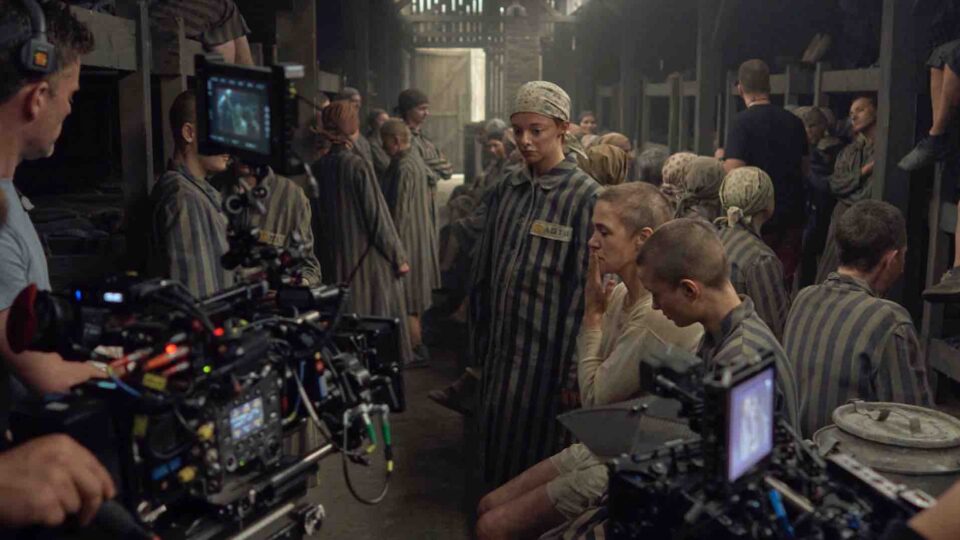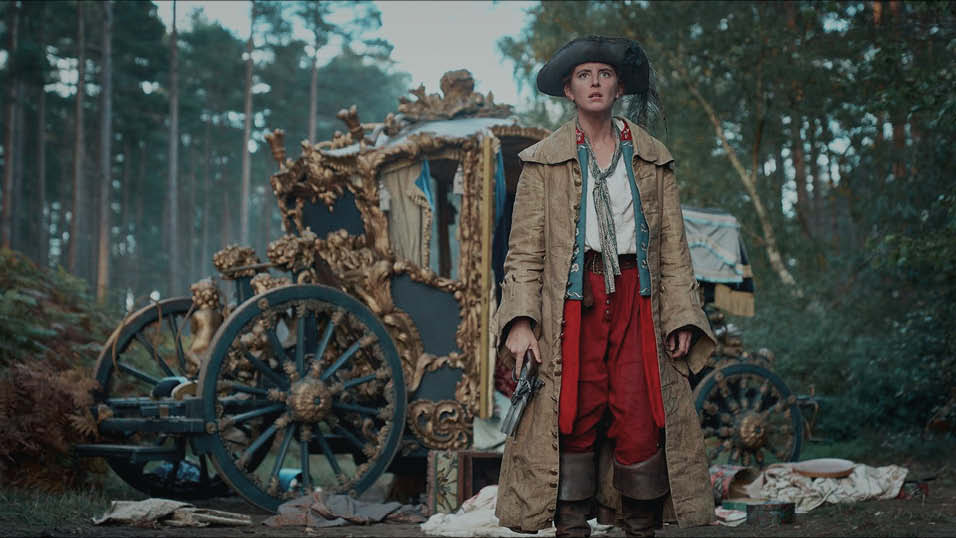The prospects for UK film production look good in 2013, with high expectations that a raft of big budget, US studio features will shoot here, as well as a significant number of UK projects.
Last month, visual effects company Double Negative moved many of its 900 staff into a new office on Great Portland Street – a building that once served as the HQ for Virgin Media. Set up 15 years ago with just 30 staff, the growth of Double Negative into such a sizeable company speaks volumes about the film production boom that the UK has enjoyed in the period.
Double Negative has produced vfx for features such as the Harry Potter franchise, Dark Knight Rises, Skyfall and Total Recall, winning significant business from US studios thanks to its talent, technical expertise and ability to deliver complex projects.
The international reputation of the UK’s vfx sector, which also includes companies such as Framestore, MPC and Cinesite, is one of the many reasons for the influx of studio films into the UK in recent years. Inward investment boom Indeed, according to BFI figures, international productions spent just over £1bn in the UK in 2011, the highest figure ever recorded.
The investment has helped create film industry jobs too: up to 62,000 people (from 48,000 in 2010). The reasons for the inward investment boom are well documented – the strength and depth of UK production and onscreen talent, the range of facilities such as vfx houses and studios, the favourable exchange rate, and the popular UK film tax credit. “The UK film industry has proved to be recession resilient over the last few years,” says Double Negative managing director Alex Hope. “It is a global centre for film production.”
He says that the prospects for 2013 look very positive, reporting that “lots of films are looking to shoot in the UK.” Double Negative, for example, is to work on effects for Andy and Lana Wachowski’s (The Matrix) sci-fi film Jupiter Ascending, which will shoot this year in the UK. The company is also working on vfx for the sequel to The Hunger Games – even though the film didn’t shoot in the UK.
Hope’s comments are backed up by Adrian Wootton, chief executive of the British Film Commission. He says that 2012 was a strong year for inward investment films, despite distractions such as the Olympics and the Diamond Jubilee, and the fact that the US studios cut costs and reduced their output. In fact, inward investment fell compared to 2011. But the UK maintained its market share of global film production last year, says Wootton. “Although fewer films are being made by the US studios generally, we got the business that was to be got,” he says, citing big budget features that filmed in the UK such as Dark Knight Rises, The Counsellor, Fast and Furious 6 and Jack Ryan.
Certainly, there was a strong end to film production in 2012, with Doug Liman (The Bourne Identity) directing Tom Cruise in sci-fi thriller All You Need is Kill in the last few months of the year. The movie closed down Trafalgar Square and the airspace around it for one scene, which saw Cruise land in the middle of the London landmark in a military helicopter.
Wootton also believes 2013 will be a strong year for inward investment, predicting that studios like Disney and Warners will shoot big films here this year. “We are looking at a solid and encouraging 2013 in film. There are an awful lot of things gearing up to come here,” he says.
The UK’s film studios also believe that the production boom looks set to continue. Pinewood Shepperton’s chief executive Ivan Dunleavy says that the “number of film productions contracted so far next year is encouraging.”
Tellingly, Pinewood began clearing a site for a new 45,000 sq ft studio facility last year. The refurbished Leavesden Studios opened in June last year, backed by investment from Warner Bros. The new studios are said to have provided an additional 30% in terms of film studio capacity to the UK market. Leavesden has been home to All You Need is Kill during its shoot. East London’s popular 3 Mills Studios will also be fully available this year, having been out of action for a chunk of 2012 because it was the base for rehearsals for the Olympics opening ceremony. And Elstree is getting multi-million pound investment to fund new film and television production facilities. Such moves should add more capacity to the UK film industry – capacity that many say is needed for the industry to cope with expected growth.
And the flow from inward investment projects could be even greater this year and next, thanks to the new tax credit for TV dramas with budgets over £1m. Wootton predicts a “significant influx” of high-end TV production will come to the UK as a result. “US companies are not saying we might come here, they are saying we want to come.”
All of which is likely to provide more opportunities for crews, creative talent and facilities in the UK.
UK film-making prospects
The prospects for UK produced films also look encouraging this year. Certainly the profile of British-made films continues to be high internationally, as proved by another strong batch of nominations for this month’s Baftas and Oscars. Working Title, which is backed by Universal Pictures, has 12 Oscar nominations alone for its UK produced and shot features Les Miserables and Anna Karenina. Eon Productions has five nods for Skyfall, while British-made animation features Frankenweenie and Aardman’s The Pirates! are also in the running in the best animated feature category.
The UK also had 15 features in official selection at last month’s Sundance Film Festival, including Michael Winterbottom’s The Look of Love, starring Steve Coogan as Paul Raymond, the infamous British entrepreneur, impresario and ‘king of Soho’.
British made films are also performing well at the box office. The Sony-backed Skyfall became the biggest grossing film of all time at the UK box office, the first to earn £100m (and its taken over $1bn globally).
Meanwhile Les Miserables impressive January opening weekend of £8.13m beat that of the previous biggest musical at the box office, Mamma Mia!. Other British made hits of 2012 include The Woman in Black, The Pirates! and The Best Exotic Marigold Hotel.
It remains challenging to raise budgets for films, though. Observers say UK film production is polarised, with more low budget films being produced as well as a significant number of higher budget features. Mid-budget films, by comparison, are very difficult to get off the ground. BFI figures show that 200 domestic productions were shot, worth a total of £200m. Of these, 124 (62%) were made on budgets under £500k. The barriers to making a film have, of course, come down considerably. For example, Ben Wheatley’s (Sightseers, Kill List) next film, psychedelic civil war drama A Field of England, was shot in just 12 days, and was fully funded by Film4’s talent and ideas hub Film4.0.
Coming soon
In fact, there seems no shortage of films being produced in the UK. Working Title has six more films coming to market in 2013: Edgar Wright’s The World’s End, Richard Curtis’ About Time, Dan Mazer’s I Give It A Year, John Crowley’s Closed Circuit, Ron Howard’s Rush and Hossein Amini’s The Two Faces of January.
Film4 has 20 films on its slate that are heading for greenlight – four of which started production last month: Lenny Abrahamson’s Frank, written by Jon Ronson and Peter Straughan; David Mackenzie’s prison drama Starred Up; Yann Demange’s thriller ‘71; and Mike Leigh’s biopic of J.M.W. Turner. Two of its bigger budget projects are Danny Boyle’s art heist thriller Trance and Jonathan Glazer’s Under the Skin. Other planned Film4 projects this year include Shane Meadows’ Stone Roses doc, Made of Stone, Kevin Macdonald’s How I Live Now, Richard Ayoade’s The Double, Clio Bernard’s Selfish Giant, Steve McQueen’s 12 Years a Slave and Roger Michell’s Le Weekend.
And BBC Films is behind a raft of productions this year too. The Alan Partridge movie started shooting in January, while its slate includes Rufus Norris’ Broken, starring Tim Roth and Cillian Murphy, the Belfast set Good Vibrations, Mat Whitecross’ Stone Roses movie Spike Island, Nick Murphy’s Blood, Stephen Frears’ Philomena and the Jude Law starring Dom Hemingway, a London set black comedy.
Film4’s head of commercial and brand strategy Sue Bruce-Smith thinks it is a “really positive time” for UK film-making, citing Film4’s presence at Sundance last month with Michael Winterbottom’s The Look of Love, Jeremy Lovering’s debut In Fear and Ben Wheatley’s Sightseers and two short films by newcomers The Curse by Fyzal Boulifa and Jonah by Kibwe Tavares.
In search of investors
Bruce-Smith says that investors – whether studios, financiers or sales agents – remain encouraged by the fact “that film is still something that audiences clearly want to see on all available platforms,” despite the more competitive media landscape.
Of course, the domestic industry remains very much dependent on public money, whether from Film4, BBC Films or the BFI, or via film tax breaks. In the UK, there is little sign of growth in terms of private investment into film – a situation that is unlikely to change given newspaper coverage of the Treasury’s high profile investigations in to film tax schemes.
But the production finance market seems to have eased up since the days that followed the credit crunch in 2007.
International investors such as Zurich-based film financier Silver Reel, film producer heiress Megan Ellison (daughter of Oracle founder Larry Ellison), and finance outfit Aver are new to the international market.
And the pre-sales market has picked up too, with sales agents now able to achieve bigger advances on projects than in previous years. Bruce-Smith cites four examples as evidence of an improved pre-sales market. CBS Films pre-bought Martin McDonagh’s Seven Psychopaths for the US, Studio Canal are backing first time filmmaker Yann Demange (Top Boy) on ‘71, Mike Leigh’s Turner pre-sold to the US and France, while Lava Bear has taken on Ben Wheatley’s upcoming Freakshift and is “confident of raising a substantial budget for it.”
The burgeoning VoD market – bolstered by companies such as Netflix and Lovefilm – also means that there is a greater demand for new films. This, in turn, has fed down and enabled distributors – like eOne, StudioCanal and Momentum – to offer more sizeable advances for UK films.
All of which suggests the prospects for UK film – as well as inward investment – remain strong for 2013. “There’s a real buzz – there’s a lot of exciting projects about,” says Double Negative’s Alex Hope.
This article is from the February issue of Televisual
Tim Dams
Share this story

















